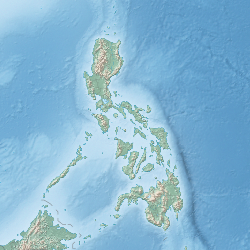Attacks
On August 24, 2020, at 11:54 am, a motorcycle bomb placed next to a military truck detonated outside the Paradise Food Plaza in downtown Jolo, Sulu. The explosion killed six soldiers, six civilians and a police officer, as well as injuring 69 others. The police and military responded to the scene. An hour later, at 12:57 pm, a female suicide bomber approached the cordoned-off area and attempted to enter. Upon being stopped by a soldier, she detonated the bomb she carried, killing herself and the soldier who stopped her, while wounding six police officers. [8] The second blast occurred approximately 100 meters (110 yd) away from the first blast, in front of a branch of the Development Bank of the Philippines. [8] In total, seven soldiers, one police officer, and six civilians were killed; and 21 soldiers, six police officers, and 48 civilians were wounded. The site of the bombing was close to the site of the 2019 Jolo Cathedral bombings. [5] [6] [7] [8]
Aftermath
The following day, the Islamic State – East Asia Province (also known as Abu Sayyaf) claimed responsibility for the attack. The government believes that Abu Sayyaf bombmaker Mundi Sawadjaan created the bombs and armed the attackers. The entire province of Sulu was placed on lockdown following the blasts. [7] [8] [9]
On August 29, 2020, in Patikul, soldiers searching for the perpetrators of the bombings were attacked by fellow Abu Sayyaf militants. The gunfight resulted in the death of a Filipino soldier and the wounding of seven others; two Abu Sayyaf militants also died in the fight. [10]
June shootings
On June 29, nearly two months before the bombings, four Army intelligence personnel, by-then investigating the possible presence of two female suicide bombers in Sulu, were killed by Jolo police officers in a shooting incident, with policemen attempted to plant evidence to cover-up the incident. [11] [12] As the bombing happened in the midst of the investigation of the shooting, the military stated the incident have disrupted the intelligence operations that might have averted the bombings, and raised a possible motive that the police officers are connected with the suicide bombers. [13] [14] [15]
Reactions
Immediately after the attacks, presidential spokesperson Harry Roque condemned the bombings saying "authorities are now conducting an investigation, which includes identifying individuals or groups behind these dastardly attacks." [16] Cabinet Secretary Karlo Nograles condemned the attacks in "the strongest possible terms" and said that terrorism has "no place in a civilized world". [17] He also stated that he will bring justice to those behind the "inhuman attack". [17] According to Dr. Rommel C. Banlaoi, a counter-terrorism expert and the Chairman of the Philippine Institute for Peace, Violence and Terrorism Research, the 2020 Jolo bombings were strong indications that suicide terrorism had become the new face of terror in the Philippines. [18] Even prior to the 2020 Jolo bombings, Banlaoi has already explained, "The rise of suicide terrorism in the Philippines arises from the contagious effect of the ideology of violent extremism propagated by ISIS foreign terrorist fighters in the country. ISIS foreign terrorist fighters capitalize on local grievances, historical animosities, and feeling of injustices to propagate violent extremism in the Philippines, particularly in conflict-affected areas of Mindanao. Violent extremism is the ideology that justifies acts of terrorism in the Philippines." [19]
This page is based on this
Wikipedia article Text is available under the
CC BY-SA 4.0 license; additional terms may apply.
Images, videos and audio are available under their respective licenses.
